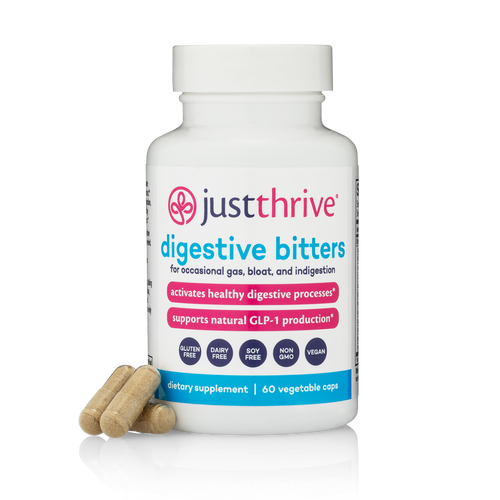Here’s something most people don’t know: You need a highly diverse population of gut bacteria to stay healthy, vital, and alive.
Gut diversity affects everything from heart function to obesity risk… and even personality traits. And low diversity has been linked with virtually all chronic diseases.
So how can you make your gut microbiome as diverse as possible? It’s easier than you think.
What Is Gut Diversity?
Your gut microbiome contains trillions of bacteria, along with some other microorganisms like viruses and fungi. And while we all share a similar group of “core” bacteria, the total makeup of your microbiome is as individual as a fingerprint. That said, there is one universal microbiome truth: The more different bacteria you have in your microbiome, the healthier your gut – and you – will be.
Most people have more than 1,000 different species of bacteria in their microbiomes. But things like aging, illness, and diet can decrease the diversity, meaning you’ll still have trillions of bacteria but far fewer different kinds. That can lead to significant health problems far beyond your gut.
Because, as science continues to show us, health, resilience, and longevity all stem from a diverse gut microbiome.

How a Diverse Gut (Or a Lack Thereof) Impacts Your Health
One reason diversity matters so much: The bacteria in your gut microbiome produce thousands of different compounds. Those include many that are necessary for your good health such as short chain fatty acids (SCFAs). But here’s the catch: You need a highly diverse population to produce all of the beneficial compounds you need to stay well.
Gut diversity can protect your health in a variety of ways. In one study, for example, researchers found that higher gut microbiome diversity was associated with higher cancer survival rates. Higher diversity has also been shown to offer protection against cognitive degenerative diseases like Alzheimer’s and even infectious diseases.
The opposite holds true too. Scientists have discovered that the lack of microbiome diversity shows up in a near countless amount of health issues and diseases. That includes gut-related problems such as Crohn’s disease and irritable bowel syndrome (IBS) as well as more surprising conditions like autism and type 2 diabetes. Research also shows that low diversity can lead to:
- Cardiovascular problems such as high blood pressure and coronary artery disease
- Psoriatic arthritis and rheumatoid arthritis
- Nonalcoholic fatty liver disease (NAFLD)
- Depression
- Stroke
The data is pretty clear: Making sure your gut microbiome stays highly diverse is one of the best things you can do to protect your health… and your life. Which begs the question: How can you make sure your gut bacteria is appropriately diverse?

Eating a Diverse Diet Can Be Tough
One of the best ways to create a diverse gut microbiome is to eat a highly diverse diet. But that’s not as easy as it sounds.
Most people eat the same basic foods over and over. Sometimes the foods appear to be different – like bread and pasta or burgers and roast beef – but in the end, they’re all coming from the same basic food source. That’s because about 75% of the world’s food supply now comes from only 5 animal and 12 plant species. Compare that to our ancestors who relied on hunting and gathering… and consumed foods from about 600 different sources.
Now think about how many different foods you eat in a typical week. For most of us, that number comes in somewhere between 10-30. But you need it to be at least 30 to support a truly diverse microbiome through diet alone.
Experts suggest that eating specific kinds of foods can improve diversity too. At the top of list are fermented foods such as:
- Kefir
- Kombucha
- Kimchi
- Sauerkraut
- Yogurt
It can certainly be tough to work enough fermented foods and dietary variety into your life. However, you can positively support your gut microbe diversity with some help from smart supplementation.
How Spore Probiotics and Targeted PREbiotics Support Diversity
To achieve beneficial microbiome diversity, your gut needs some help. One of the best tools in your gut-love toolbelt comes from a combination of spore probiotics and special prebiotics.
First, spore probiotics help wrangle unwanted bacteria to clear space for a diverse population of helpful bacteria.
One study found that a combination of 4 spore probiotics – Bacillus indicus HU36, Bacillus subtilis HU58, Bacillus coagulans, and Bacillus clausii – drove optimal diversity in the gut microbiome in just three weeks.
Then targeted prebiotics step in to fully nourish probiotic bacteria so they can grow and flourish. These prebiotics are the exact kind of fiber that a wide variety of beneficial bacteria prefer to consume. Even better, specific prebiotics such as FOS (fructooligosaccharides) and GOS (Galactooligosaccharides) have been shown to support optimal microbiome diversity in scientific studies.
By supplying your gut microbiome with spore probiotics and prebiotics, you’ll be well on your way to encouraging robust and healthy bacterial diversity.
Celebrate Diversity with Just Thrive
A highly diverse gut microbiome delivers countless health benefits that your body relies on to keep you in great shape.
The spore strains in Just Thrive Probiotic have been shown in studies to help maintain a healthy, diverse gut microbiome.
That’s because Just Thrive Probiotic contains four clinically studied and proven effective strains:
- Bacillus indicus HU36™
- Bacillus subtilis HU58™
- Bacillus coagulans
- Bacillus clausii
Just Thrive Precision PREbiotic contains a unique blend of clinically tested prebiotic fiber:
- FOS (fructooligosaccharides)
- GOS (galactooligosaccharides)
- XOS (xylooligosaccharides)
These special prebiotic fibers have been shown to selectively support beneficial gut bacteria (and steer clear of the pathogens) to encourage microbial diversity.
Start supporting your gut microbiome diversity today with Just Thrive Probiotic and Just Thrive Precision PREbiotic.














